I met Dean Gardiner in Chicago in 1994. It was my second year of paddling and we were in Chicago at the start a month-long stage race from Chicago to New York. He’d recently won Molokai and the forecast for 20 knot winds for our 33 mile crossing of Lake Michigan left him giddy. This was my first year on a surf ski and I approached the stage with the confidence of a drunk on roller skates. Halfway across, I’d swum somewhere between 9 and 90 times; the lake was a vast, confused sea of white caps.
Gardiner won the stage, beating four-time Olympic medalist Greg Barton by 12 minutes.
Afterwards, I said: “The waves were pretty wacky out there.”
The word “waves” seemed to confuse the laid back lad from Sydney, who had quit school to work on a fishing trawler at the age of 15. Though the raw deck hand spent three days puking into his rubber boots when the boat was battered by a cyclone his first week out, by the time I met him he’d become a seasoned skipper and had set the Molokai course record of 3 hr 24 min. across a body of water considered the roughest navigable channel in the world.
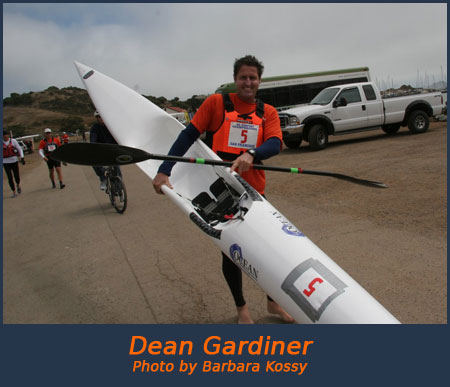
“Just a bit of chop, mate,” he said matter-of-factly.
“Blank you!” I said in my best Brooklynese. “Where I come from those are called waves!”
Not surprisingly, I thought of this exchange last week at the US Surf Ski Champs in San Francisco. The field featured two dozen world class paddlers, including a host of Olympic animals from Australia who possessed both serious flat water speed and ample chops in the ocean. With superior fitness and youth on the side of paddlers like Jeremy Cotter, a former professional Ocean Ironman, Caine Eckstein, the two-time winner of a grueling multi-sport ocean race called the Coolangatta Gold, and Murray Stewart, just back from the World Sprint Champs in Halifax, I figured that the only way Deano – a not-so-lean father of three — had a chance to crack the top five was if the course rewarded superior downwind skills.
It did.
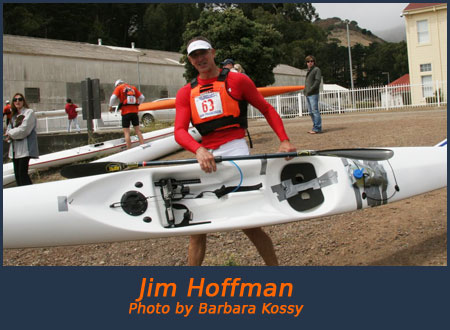
This was the fifth time I’d competed in San Fran but much about the race was new. The race had been moved back a month to August 22, a time of year when the afternoon winds tend to funnel through the “gate” – the gap in the cliffs spanned by the city’s iconic bridge — and transforms the scenic, heavily-trafficked bay into a technically challenging hold-on-to-your hat paddling venue. Moreover, the course had been changed so that all but four of the 17 miles would be downwind. No wonder Gardiner, who’d done the inaugural event in 2003, finishing second to Barton, was back.
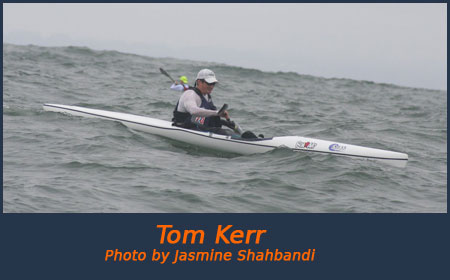
By my count few paddlers from the Northeast have entered the race. This year, however, we were a gang of seven: Cory Lancaster, Eric McNett, Steve DelGaudio, Tom Kerr, Jim Hoffman, Alex McLain, the lone female amongst us, and yours truly. Several weeks earlier, schmoozing after an ocean race in Jamestown, RI, a few of the boys who’d signed up for San Fran said they found the conditions off Beavertail Point to be pretty rough. The swell was two-to-four foot with some breaking waves, but compared to the conditions San Fran can dish up it was a virtual millpond. I’d recently returned from humbling races Mauritius and Durban, where conditions ranged from huge to darn big, and as I listened to my East Coast brethren I was reminded, yet again, of the disparity between a paddler and a waterman.
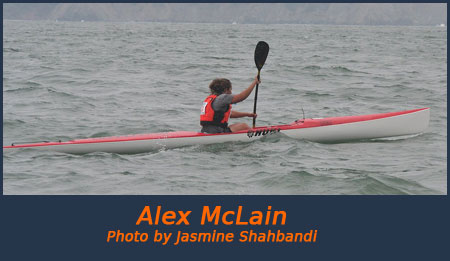
This point was rammed home at the paddling demo in Berkeley the day before the race. Eric McNett, a fit, seasoned flat water canoeist from Topsham, Maine who’d recently made the transition to a surf ski, told me that his goal for the race was to “to keep the round side of the boat down.” And Jim Hoffman, an affable 50-year-old father of four who does much of his training on the Hudson River, told Cape Town’s Dawid Mocke that his primary aim was to make it around Point Bonita “without dying!“
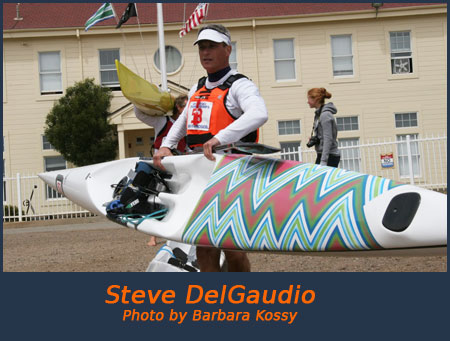
Dawid, whose idea of fun is chasing runs at Mavericks, laughed but Hoffman later told me that his heart rate on the starting line was 145 and for the first hour of the race he was in “holy-shit-this-is-crazy mode.” In other words, he was only joking a little.
At 1:30 PM, 100 skis formed a jagged line on the bay side of the Golden Gate Bridge. Though I’d donned tights, paddling shorts, two shirts and neoprene booties, it felt like New York in November not California in August. In fact, had I a buck for every time I heard a competitor (or myself) say, “It’s friggin’ freezing out there,” I’d have covered my entry fee.
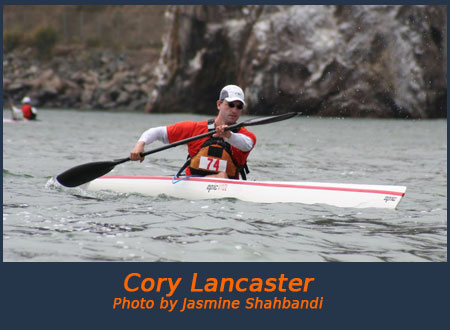
Bashing into a four-knot current and 20-knot head wind, an activity one Aussie likened to “banging your balls with a rubber mallet,” I followed Carter Johnson, a local who lives on a houseboat nearby in Sausalito. In June, Johnson won the solo kayak division of the Yukon Quest, a 460-mile, mostly, non-stop ultra up yonder in Canada. We’d paddled side-by-side last December in Dubai and South Africa so I figured he’d be a good man to mark; however, Carter was paddling as if he’d rented his ski by the minute because keeping up with him into the wind in the “chop” bouncing off the salt-stained cliffs before Point Diablo was, if anything, more unpleasant than self-abuse with a mallet.
Up ahead, approaching two pyramid-shaped rock outcroppings, Mocke, Cotter, and Eckstein, Cotter’s training mate on the Gold Coast, were at the sharp end of a six-man pack. Two years ago, I’d watched as Canada’s Ian MacKenzie, one of the world’s top flat water marathoners, barely scamper over the top of a big breaking wave that had sprung up between the rocks like a jack-in-the-box. A few of the top dogs sneaked through the rocks – a move race director Dave Jensen told us to strenuously avoid – but I wasn’t one of them.
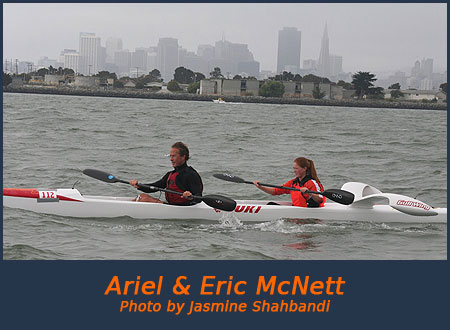
I wasn’t bracing; I wasn’t freaking out about swimming or dorsal fins or the sorry state of my hair (maybe just a little), but I was wobbly and struggled to move up in the field. Cory Lancaster, a 34-year-old engineer from Beverly MA who’s been paddling for nine years, felt as sturdy as a plywood outhouse high on Mt. Washington. “I was getting pushed around. I kept seeing sea lions, which are bigger and toothier than seals. I figured there wouldn’t be sea lions around if sharks were in the area…or so I kept telling myself.”
While it was more than a tad depressing to see how small the lead pack had become beyond Point Diablo, I’d maintained contact with Carter and to his right was my man Eric Borgnes, sixth here last year. Hawaii’s Mark Sandvold passed me, shouting “Gliiiiiiiiicker!” over the din of the wind. In May, Sandman and I had escorted winner Hank McGregor across the Molokai Channel and hearing his voice spurred me on. I scratched forward along the cliffs and out to the red-and-green buoy off Point Bonita, which swayed like a giant bowling pin about to topple.
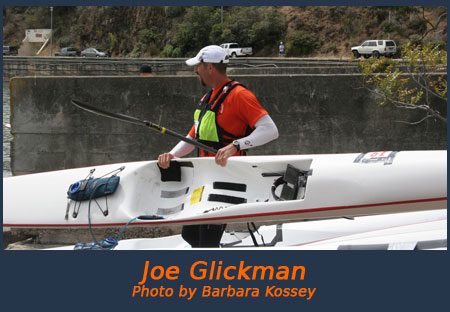
Cotter and Mocke rounded the buoy first, followed by Eckstein, Murray Stewart, Tony Schumaker(who’d competed in Beijing for Australia), and Sean Rice – four Aussies and two Springboks. By the time the lazing seals slipped off the buoy into the brackish drink, Gardiner, his head titled to the side as always, came past in eighth with Durban’s Barry Lewin chasing.
I’m not sure Deano ever had the flat water speed of the Cotters and Mockes of the paddling world, and he has even less now, but his aquatic IQ is sky high. As the front pack moved hard left towards the bridge’s North Tower, the 44-year-old skipper surfed wide right into a more favorable current where the wind was stronger and swell larger.
Game on.
The three miles from the turn buoy to the Golden Gate Bridge featured a lumpy three-to-five foot swell running towards the cliffs. The top dogs began linking the runs only slightly less adeptly than the dolphins that scooted by, but us hackers from the Right Coast were experiencing a rude dose of raucous Bay reality.
Fighting to drop down the swift-moving faces of these swells, I groveled to find a surf-and-relax rhythm – a task made more difficult while cursing in Yiddish as the guys I was with edged ahead. Tom Kerr, who was battling to remain vertical, said his heart rate out at Point Bonita was a hummingbird-esque 191. Eric McNett was unable to keep his Huki hull wet; Steve DelGaudio was floundering like a frozen fish from Cos Cob, CT, and big Jim Hoffman, the fleetest paddler in Bedford, NY, flew down a big bump, buried the bow to his knees and felt an overwhelming need to call his mother.
Heading back under the Golden Gate Bridge, Cotter and Mocke were side-by-side and clear of the lead pack. Mocke, who runs a surf ski school in Cape Town, is more gregarious than Cotter, but as athletes they are remarkably similar. Both were swimmers and Ocean Ironman (swim, ski, paddle board, run). Both train extremely hard, and often. And both try to slay their competition by racing off the front.
Last year at the Dragon Run in Hong Kong, Cotter and Mocke blasted off the line, dropped the field, and took turns trying to break the other. Cotter controlled the majority of the race and seemed headed for the win, but the rudder cables on his ski slipped late in the game and he limped crankily home in third. Cotter trained like a man possessed for the Euro Challenge in Spain this May and arrived in superb shape. Sadly, the night before the race the 30-year-old paramedic fell ill with food poisoning and was unable to finish. So while Mocke, a two-time US Surf Ski Champ, has a mantel full of World Cup trophies, Cotter (a relative newcomer to the international long distance ski scene), had yet to break through. So while Cotter may be content to say little and carry a big paddle, I’d spoken to him enough to know that he was highly motivated to win his first World Cup title.
Just under the bridge, Cotter put in an interval and surged ahead of his rival. In retrospect Mocke told me that he should have matched Cotter’s move. “I knew the final leg from Angel Island to the end would be critical,” he said, “so I decided to conserve. Turns out I conserved too much.”
As the race went on, the wind seemed to pick up and the waves steepened; Cotter maintained his lead on Mocke, cruising along at roughly 11 mph. Surfing right to left, Deano slipped past Shumaker, Rice and Stewart and pulled alongside Eckstein, a lad 22 years his junior who Cotter called the “fitness man in the field.”
Gardiner called the conditions “interesting” with “lots of stuff going on” — Deano-speak for saying he was linking the bumps and flying. Stewart, a world class sprinter and savvy ski paddler who raced in a double in South Africa last December with Dean, told me, “No matter how fit I get and how unfit (or unmotivated) Dean is at a particular time, he always flies when there’s a hint of wind.”
Barry Lewin, who was in spitting distance of Gardiner at the buoy off Angel Island, said it more succinctly: “I couldn’t hold his intensity.”
In fact, the runs from Angel Island to the finish in Berkeley were steep and incredibly fun. My biggest problem, other than a general lack of competence, stemmed from the fact that the short (non-surfing) rudder on my ski kept losing purchase on the wave, causing me to spin out with maddeningly regularity over the last six miles. I lost precious time and places.
Comparisons may be odious but they often put things in perspective. Steve DelGaudio, who called this the “roughest water he’d ever raced in,” swam as many as a dozen times and long, anxious saga short, made it to the line on an escort boat chilled to the bone. Jim Hoffman bonked and Tom Kerr went into “just stay upright” mode over the last three miles, but they both finished. And a cramping, shark-phobic Cory Lancaster was broaching, bracing and “went for that inevitable, christening swim.”
Collectively, we were humbled and wasted but, as we downed Lagunitas beer and gnawed on gristly bar-b-que at the post-race party, unaccountably upbeat.
The next day my family and I drove down US 1 to a state park filled with giant redwoods south of Big Sur. Cruising along jagged, jaw-dropping cliffs overlooking the Pacific, one part of my brain – the egomaniacal side focused on dashed expectations and I couldn’t stop thinking about how much better I’d have done were I to train out here on a daily basis. But then I’d flash to a ride on a kick ass wave that I had to learn back like a rodeo cowboy to stop from burying the nose, and feel the eager rush of joy that keeps me in the game no matter how crude my rough water skills.
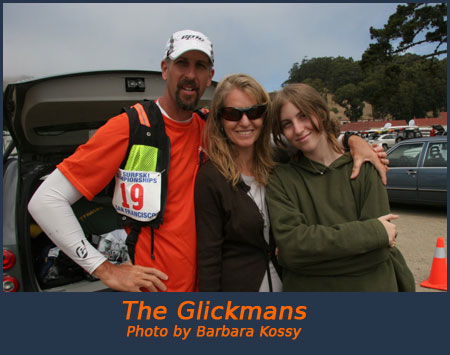
When I got home, the post-race e-mail chatter revealed it was a sentiment shared by us all. Lancaster, who rowed collegiately and finished fifth at this year’s Blackburn, wrote: “Whatever sport we do in the northeast on surf skis is unlike what’s done in other parts of the world – so much so, it might even be considered another sport.” On the flip side, Jim Hoffman was positively giddy describing the four slick runs he linked, a first. “When I finally got aggressive and started to surf most of the fear turned to exhilaration. So cool!”
Joe Glickman
Click to Visit US Surfski Championship Web Site for Short Course and Doubles Results
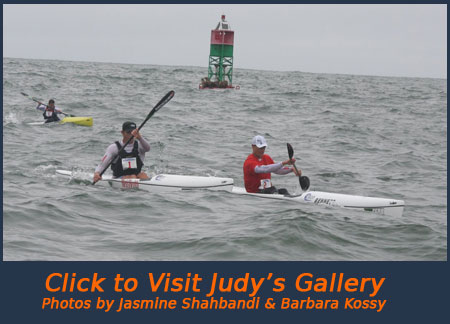
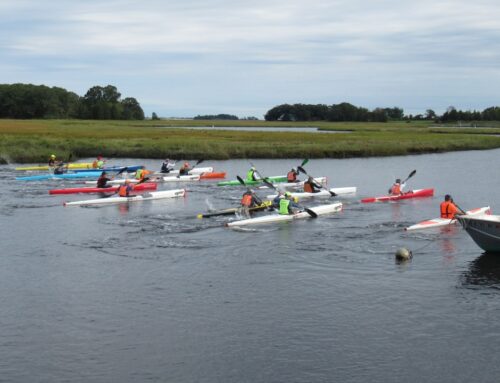
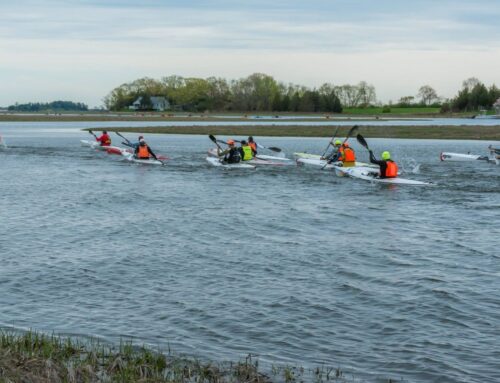
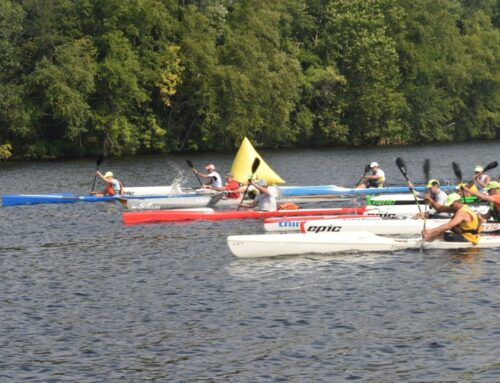
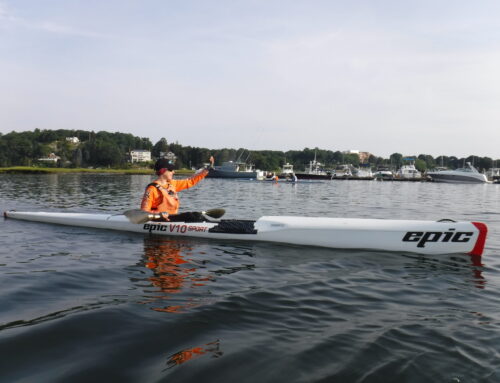
Leave A Comment
You must be logged in to post a comment.